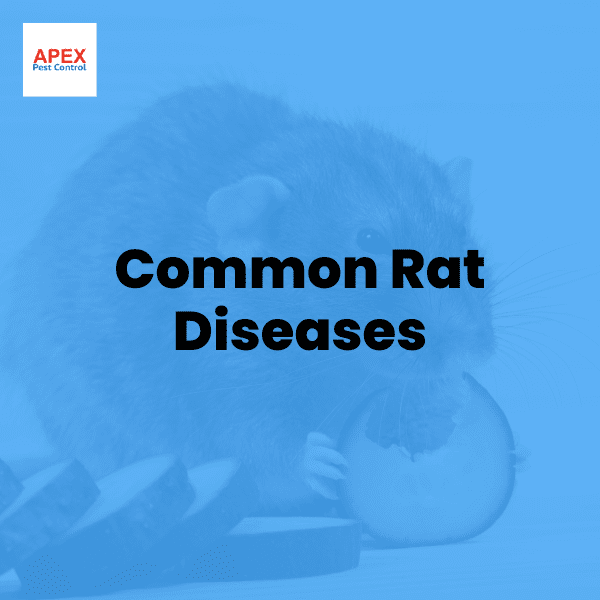Rat Diseases: The Hidden Health Risks In Your Home
As a leading pest control company, Apex Pest Control is committed to educating our customers about the potential health risks associated with rat infestations. In this comprehensive guide, we’ll explore common rat diseases, their impact on human health, and effective prevention strategies.
Explore our comprehensive guide to Effective Rat Control Strategies, offering proven methods for safely and efficiently managing rodent infestations in both residential and commercial spaces.
Common Rat Diseases
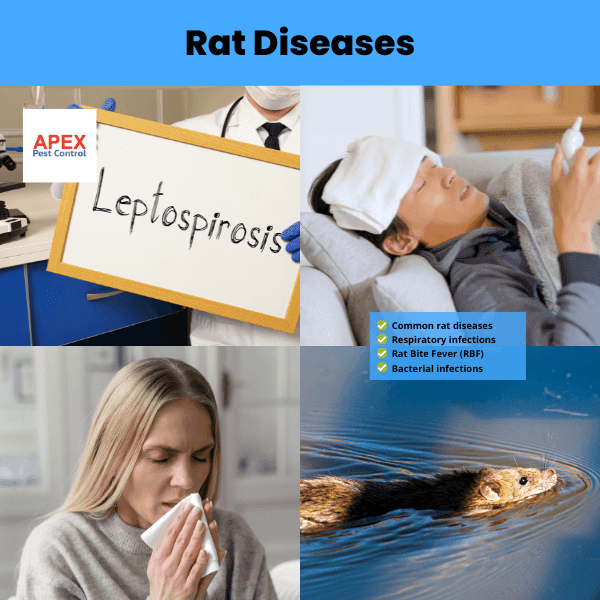
Rats are known carriers of various zoonotic diseases, which can be transmitted to humans. Understanding these diseases is crucial for effective pest management and public health.
Respiratory Infections
Respiratory infections are among the most common diseases found in rats. These infections can be caused by various pathogens, including bacteria and viruses.
Symptoms in rats:
- Difficulty breathing
- Lethargy
- Loss of appetite
- Nasal or eye discharge
Treatment:
Respiratory infections in rats are typically treated with antibiotics prescribed by a veterinarian. Early intervention is crucial to preventing serious complications or fatalities.
Rat Bite Fever (RBF)
Rat Bite Fever is a serious illness caused by bacteria transmitted through rat bites or scratches.
Symptoms in humans:
- Fever
- Rash around the bite wound or other parts of the body
- Swollen lymph nodes near the bite site
- Vomiting
- Muscle pain
Causes:
RBF is primarily caused by two bacteria:
- Streptobacillus moniliformis
- Spirillum minus
Treatment:
Antibiotics are usually effective against RBF, especially when administered early after onset. Severe cases might require hospitalisation for intensive care, including intravenous antibiotics administration.
Leptospirosis
Leptospirosis is a bacterial infection that affects both rats and humans. It’s particularly concerning due to its potential severity.
Symptoms:
- High fever
- Chills
- Headaches
- Muscle soreness
- Abdominal discomfort
- Jaundice
- Coughing
Cause:
Leptospirosis is caused by Leptospira bacteria, primarily present in rat urine.
Treatment:
Leptospirosis is treated with antibiotics. However, prevention is key, given the potential for serious outcomes such as renal failure, pulmonary haemorrhage, and meningitis.
Prevention of Rat Diseases
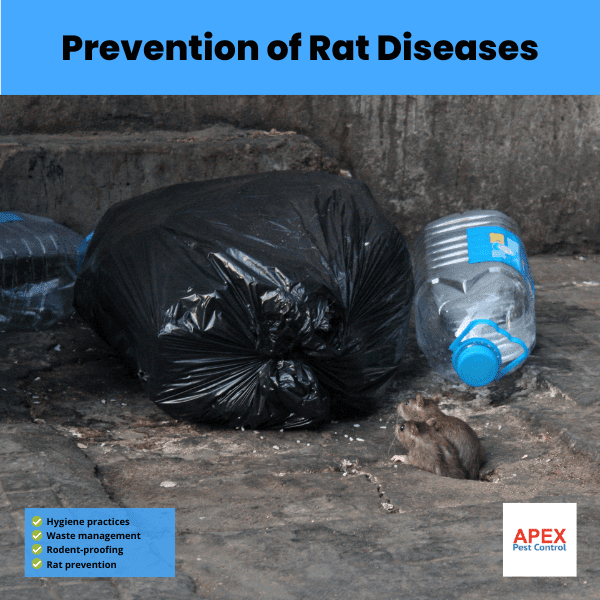
At Apex Pest Control, we believe that prevention is the best approach to managing rat-borne diseases. Here are some effective strategies:
Proper Hygiene
Maintaining good hygiene is crucial in preventing rat diseases. This includes:
- Regular cleaning of living spaces
- Proper waste management
- Sealing food in airtight containers
- Washing hands thoroughly after handling rats or cleaning their habitats
Regular Pest Control Inspections
Professional pest control services, like those offered by Apex Pest Control, can help identify and address rat infestations before they become a health hazard. Our experts recommend:
- Quarterly inspections for residential properties
- Monthly inspections for commercial properties
- Immediate inspection if you notice signs of rat activity
Rodent-Proofing Your Property
Preventing rats from entering your property is a crucial step in disease prevention. Apex Pest Control recommends:
- Sealing all potential entry points
- Keeping vegetation trimmed away from buildings
- Storing firewood and lumber away from the house
- Using rodent-proof containers for outdoor garbage storage
Impact of Rat Diseases on Humans
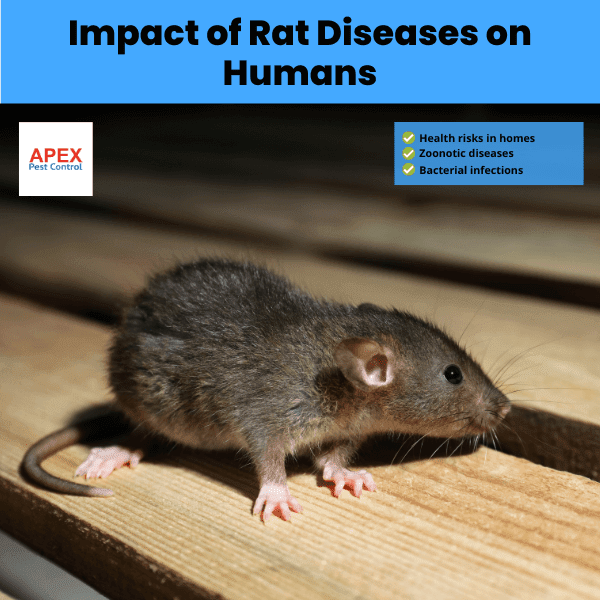
Understanding the potential impact of rat diseases on human health is crucial for emphasising the importance of prevention and control measures.
Zoonotic Diseases
Zoonotic diseases are those that can be transmitted from animals to humans. Rats are known carriers of several zoonotic pathogens, including:
- Hantavirus
- Salmonella
- Leptospira
- Bartonella
These diseases can cause a range of symptoms from mild flu-like illnesses to severe, life-threatening conditions.
Prevention Measures for Humans
To protect yourself from rat-borne diseases, Apex Pest Control recommends:
- Avoiding direct contact with rats or their droppings
- Wearing protective gear when cleaning areas with potential rat activity
- Properly ventilating areas before cleaning to reduce the risk of airborne pathogens
- Seeking immediate medical attention if bitten or scratched by a rat
Case Studies of Rat Diseases
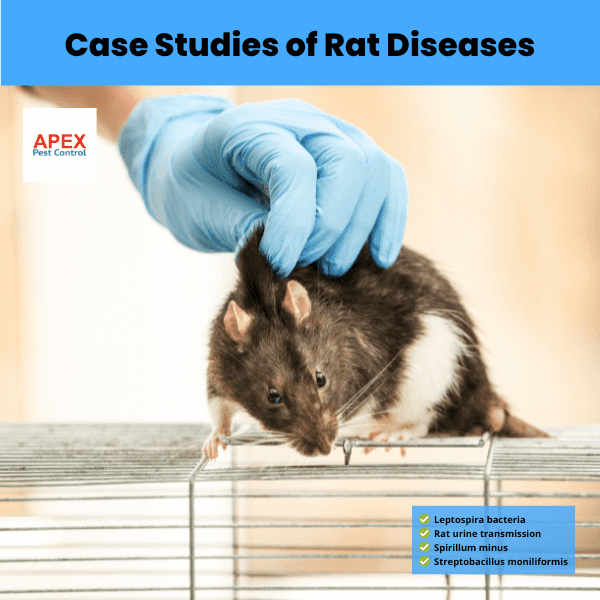
To illustrate the real-world impact of rat diseases, let’s examine some case studies:
Case Study 1: Leptospirosis Outbreak
In 2018, a leptospirosis outbreak in New York City was linked to rat infestations in low-income housing areas. This case highlights the importance of proper sanitation and pest control in urban environments.
Case Study 2: Hantavirus in Rural Areas
A cluster of hantavirus cases in a rural community was traced back to exposure to deer mice droppings in rarely-used buildings. This case emphasises the need for caution when entering long-unused structures in rural areas.
Case Study 3: Rat Bite Fever in Pet Owners
Several cases of rat bite fever have been reported in owners of pet rats, underscoring the importance of proper handling and hygiene practises even with domesticated rodents.
Emerging Research on Rat Diseases

Recent scientific studies have shed new light on rat-borne diseases:
- A 2020 study published in the Journal of Urban Health found that climate change may be expanding the range of disease-carrying rats, potentially exposing new populations to rat-borne illnesses.
- Researchers at the University of Sydney have identified new strains of Leptospira bacteria in urban rat populations, highlighting the evolving nature of these pathogens.
- A groundbreaking study in Nature Communications has revealed that stress in urban environments may make rats more susceptible to carrying and transmitting diseases.
Apex Pest Control’s Approach to Rat Disease Prevention

At Apex Pest Control, we take a comprehensive approach to rat control and disease prevention:
- Thorough Inspection: Our trained technicians conduct detailed property assessments to identify rat entry points and nesting areas.
- Customised Treatment Plans: We develop tailored strategies based on the specific needs of your property and the extent of the infestation.
- Use of Advanced Technologies: We employ the latest in rodent control technologies, including eco-friendly baits and electronic monitoring systems.
- Ongoing Monitoring: Regular follow-up visits ensure long-term protection against rat infestations.
- Education: We provide our clients with information on rat prevention and the importance of maintaining a rat-free environment.
Frequently Asked Questions
What are the most common rat diseases that affect humans?
The most common rat-borne diseases affecting humans include leptospirosis, rat bite fever, salmonellosis, and hantavirus pulmonary syndrome.
How can I tell if a rat in my home is carrying a disease?
It’s impossible to tell if a rat is carrying a disease just by looking at it. Always assume that rats and their droppings may be contaminated and take appropriate precautions.
What should I do if I suspect I’ve been exposed to a rat-borne disease?
If you’ve been bitten or scratched by a rat, or have come into contact with rat droppings, seek medical attention immediately. Inform your doctor about potential exposure to rat-borne pathogens.
Are some people more at risk for rat-borne diseases than others?
Yes, individuals with weakened immune systems, the elderly, and young children may be at higher risk for severe complications from rat-borne diseases.
How effective are over-the-counter products in preventing rat-borne diseases?
While some over-the-counter products can help control rat populations, professional pest control services are more effective in preventing infestations and reducing the risk of disease transmission.
By understanding the risks associated with rat-borne diseases and taking proactive measures to prevent infestations, you can protect your health and the health of your loved ones. Trust Apex Pest Control to provide expert guidance and effective solutions for all your rat control needs.

Tony Johnson, Founder & Lead Technician at Apex Pest Control, is a BPCA and NPTA accredited pest management expert with over 35 years’ hands-on experience. Tony specialises in Integrated Pest Management and ensures all services comply with UK pest legislation, including the Wildlife and Countryside Act 1981 and COSHH Regulations 2002. His commitment to continual learning and adapting to industry best practices means clients receive effective, safe solutions for pests affecting homes and businesses across South Yorkshire. Tony’s dedication to professional standards, ethical treatment methods, and local expertise has made him a trusted partner for pest control and prevention.
-
BPCA & NPTA accredited | CHAS certified
-
Committed to UK pest law compliance & safety
-
Focused on effective, ethical pest management for South Yorkshire

